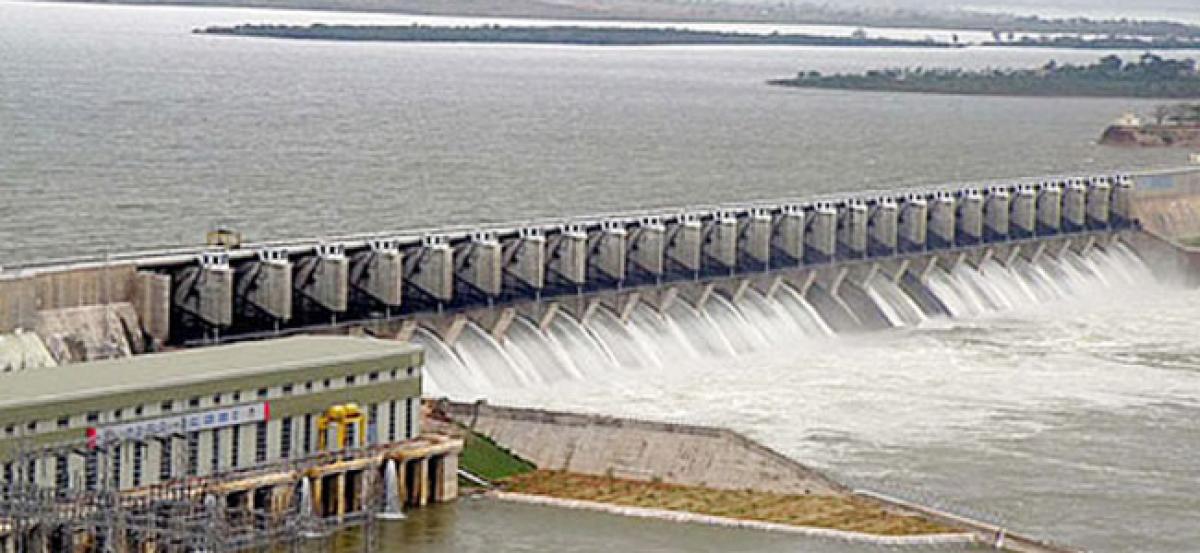Live
- SC suspends Orissa Cong MLA's sentence in graft case
- RBI lists 6 factors powering India’s take-off to become world’s 3rd largest economy
- Multiple catalysts for re-rating across verticals as RIL exits fourth investment cycle: Morgan Stanley
- ISL announces tentative venue for 2023-24 final
- Indira Gandhi coined 'Gareebi Hatao' slogan, her grandson still repeating it: CM Yogi
- Pawan Kalyan’s assets up by 215 per cent, owns 11 vehicles
- Byju’s vs investors: NCLT defers hearing to June 6
- Biryani blunder: Lord Ram's image on plates sparks outrage in Delhi
- Congress made HD Devegowda PM, don’t know why he is shedding tears: DCM D K Shivakumar
- DGCA Mandates Airlines To Ensure Children under 12 Are Seated with Parents On Flights
Just In

Andhra Pradesh argues that the GOs issued in united Andhra Pradesh were only for feasibility survey but not for construction. This sounds fallacious as a government does not intend feasibility survey without deciding on the construction of the projects.
Despite some positive movement in the ongoing tussle between Andhra Pradesh and Telangana over sharing of Krishna waters at the just concluded apex council meeting, the acrimony on the core dispute continues. The bone of contention is construction of Palamuru Rangareddy and Dindi lift irrigation schemes taken up by the Telangana government. Andhra Pradesh objects that it is in violation of the Andhra Pradesh State Reorganisation Act.
The PART IX of the Act states that the functions of the apex council shall include planning and approval of proposals for construction of new projects, if any, based on Godavari or Krishna river water, after getting the proposal appraised and recommended by the respective river management boards and also by the Central Water Commission, wherever required. These projects planned by Telangana do not have the approval of the apex council. The conflict arises as Andhra Pradesh terms them new projects that require approval of apex council and others concerned. But, Telangana cites the GOs issued in the united Andhra Pradesh to defend that they are old projects only. Hence there is no need for any such approvals. The Andhra Pradesh government also did not seek any approvals for Pattiseema project that links Godavari and Krishna rivers, it points out.
Andhra Pradesh argues that the GOs issued in united Andhra Pradesh were only for feasibility survey but not for construction. This sounds fallacious as a government does not intend feasibility survey without deciding on the construction of the projects.
Telangana expects more water on three counts. The KWDT-2 allocated for united Andhra Pradesh 190 tmcft over and above the allocations made by KWDT-1. Telangana should also get some share in this. The water holding capacity in Srisailam and Nagarjuna Sagar reservoirs has come down as compared to the project-wise allocation due to siltation. This water can also be diverted to other projects.
Andhra Pradesh as per the tribunal awards has to share some water with upper riparian states as it links Godavari with Krishna.
Instead of bickering on whether the projects proposed are new or old, it is better to adhere to the core principle of inter-state sharing of water. The concerns of the lower riparian state, Andhra Pradesh, cannot be brushed under the carpet. Telangana has to respect the fears of its lower riparian neighbour. The Government of Telangana has time and again said that it would not draw even a single drop of water over and above the allocations made to the State. Andhra Pradesh should also respect the assurance of Telangana government and seek a proper mechanism to ensure that this promise is kept.
At the apex council meeting, the two States agreed in the presence of the Centre to install telemetry system to monitor water utilisation by both the States at all major projects. The two States also agreed to constitute a joint committee of engineers to study water availability in river Krishna for the two States. This mechanism can be put in operation to ensure that Telangana actions do not hurt the interests of Andhra Pradesh. The two States should observe the ‘Live and let live’ approach.

© 2024 Hyderabad Media House Limited/The Hans India. All rights reserved. Powered by hocalwire.com







